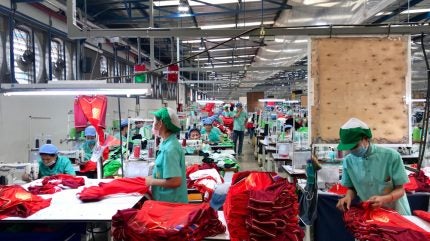
ACT’s negotiations are ongoing, but the development of reaching individual binding agreements on wage bargaining is considered groundbreaking and could have wider implications for the apparel sector.
What is the issue?
Speaking at the Global Fashion Summit in Copenhagen, Olivia Windham Stewart, business and human rights specialist explained: “Garment worker wages continue to be a challenge for the apparel sector.” She added that when wages had increased, this was rarely in line with inflation and the rising cost-of-living.
Christina Hajagos-Clausen, director, textile and garment industry, IndustriALL Global Union, noted that wages have been a “systemic issue” for garment workers globally, but added that now was the time for action. “We need to move from voluntary to legally binding” agreements she suggested.
What is the development in Cambodia?
The agreements announced in Cambodia are considered to be a significant milestone towards the first brand-supported collective bargaining agreements (CBAs) in the garment and footwear sector.
ACT, IndustriALL and a number of international fashion brands and retailers have agreed to support sustainable wage growth through collective bargaining.
PVH, which owns brands such as Tommy Hilfiger and Calvin Klein, is one of the fashion companies that has signed a legally-binding agreement to support collective bargaining. Speaking at the summit, Michael Bride, senior vice president, corporate responsibility, global affairs and responsible supply chain at PVH, said that while CBAs are not an easy solution, PVH felt that signing the agreement was the “right thing to do”.

US Tariffs are shifting - will you react or anticipate?
Don’t let policy changes catch you off guard. Stay proactive with real-time data and expert analysis.
By GlobalDataIt is important to note that the bilateral support agreements between individual brands and IndustriALL are separate from the ongoing collective bargaining process in Cambodia, which is running in parallel.
Mira Neumaier, executive director at ACT told Just Style: “These are groundbreaking agreements because this is the first time brands are encountering individually legally binding agreements with IndustriALL Global Union to support collective bargaining.”
Benefits to apparel brands signing wage bargaining agreements
The new wage bargaining agreements aim to support structural transformation and promote good industrial relations. ACT says it offers a “win-win strategy” that meets both investor expectations and human rights due diligence.
“A successful CBA brings peace – and that’s good for business,” PVH’s Bride added. “This makes sense, not just from a human rights perspective, but from a business perspective.”
With increasing scrutiny of supply chains from the new CSDDD and DPP regulations in the EU, improved industrial relations could also become a necessity for many fashion brands in the coming years.
Neumaier explained that the new agreements could help ensure that brands are meeting their obligations here: “These agreements aim to provide all the actors with the necessary reassurance that they need,” he told Just Style.
How could the deals impact the wider sector?
“We don’t want to overstate this, but we think the potential implications of this agreement are profound,” Neumaier told delegates at the event.
She added that ACT was now at a place where they felt they could “square the circle” on CBAs and hoped the model created in Cambodia would “drive improvements in industrial relations” more widely.
IndustriALL’s Hajagos-Clausen explained that CBAs could be used as a “mechanism” or tool to allow fashion brands to support higher wages.
“The structure of these individual agreements could change the overall relationships in supply chains.” Neumaier added.
Adil Rehman, head of human rights at online fashion retailer Asos, which has also signed an agreement, told delegates in Copenhagen that the deals could have the potential to “change the industry as a whole” if the idea takes off.
Rehman added that fashion brands should think about how they want to change the sector in the future. “It’s taken some time to get here, but for us it’s the best opportunity to change the industry,” Rehman added.
What happens now?
Neumaier explained the bargaining process in Cambodia is ongoing but added: “It’s very promising that the employees and the unions have reached some alignment already on what is important and what their priorities are and how to address this.”
Athit Kong, president at Coalition of Cambodian Apparel Workers Democratic Union (C.CAWDU), which represents more than 40,000 workers in the garment industry, told delegates in Copenhagen: “We are working very hard with the ACT process to support the CBA that promotes better wages and working conditions.”
He called the news an “extraordinary development” and said it could lead to “more peace and prosperity in the industry.”
Kong added: “We can use this significant platform and breakthrough to promote better working conditions and better wages and competitiveness.”



